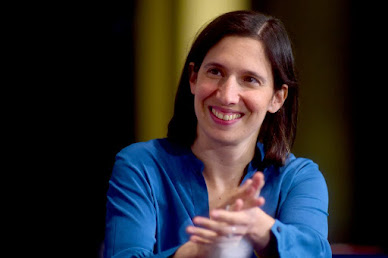When Elly Schlein was elected secretary of the Democratic Party (PD) in Italy, two months ago, I thought it was just a desperate attempt to revive a party that had nothing more to say in politics. But I was wrong. Elly Schlein is not the result of the convulsions of a dying organization. She is a major innovation in public relations, designed to revolutionize the Italian, and perhaps the world's, political landscape.
Up to not long ago, politicians tended to project the image of the strong man, the "father of the country" whose decisions were always wise. That's past and gone, perhaps forever. The levers of political power have moved to the obscure lobbies that control governments, while the job of politicians is now mainly to maintain a semblance of popular participation in the governing process. In short, they all image and no substance.
Ms. Schlein is part of this evolution. She is the tip of an innovative PR campaign launched by the PD and their sponsors, and she is using the same strategy that Silvio Berlusconi, former Italian PM, used for decades: it doesn't matter how many people hate you: what matters is how many people vote for you.
So, Berlusconi targeted the least cultured sections of the Italian population with a personal image of a rich man who could do whatever he wanted. If you are poor, it is a figure that you may dream of imitating. Plenty of people hated Berlusconi for his image, but he consistently won elections over a political career of a few decades.
Elly Schlein is doing something similar. She is not trying to appear to her potential voters as "one of us," but, rather, "what every one of us would like to be," at least for the target she is aiming at; that of young, left-oriented people in the West. So, she projects her image as young, independent, bisexual, globalist, feminist, and, more than all, a successful woman who can manage herself and her sexual preferences the way she wants. Among other things, she had no qualms in disclosing that she employs a "harmochromist" a sort of assistant buyer at Eur 300/hour to take care of the color combinations of the dresses she wears. In short, the perfect image of "radical chic," now better known under the name of "woke." And the fact that she does not look like a fashion model shows that her success is the result of her skills, not her looks.
The PR strategy of Elly Schlein has been very successful, at least up to now. Huge numbers of "leftists" rushed to their keyboards to defame her on all social media for betraying the working class because of her interview with Vogue, her fashionable dresses, and her harmochromist assistant. Remarkably, none of them realized that they were doing exactly what Schlein's PR managers wanted them to do. They wanted her to gain the attention of the media; and avoid repeating the mistake they had made with the lackluster former secretary, Enrico Letta. These good leftists didn't realize that they were making the same mistake they made with Berlusconi: the more they attacked him, the more they made him popular. Again, it doesn't matter how many people hate you; what matters is how many people vote for you.
Of course, politics is not just a question of physical image; you have to have opinions, programs, and platforms. In this field, Schlein seems to have understood the critical point of modern politics. You may be criticized for what you said but not for what you didn't say. So, the skill of a modern politician is to be able to speak a lot while saying nothing. Schlein appears to have mastered this skill, at least from what we can read in her recent interview with Vogue Magazine. (excerpts in English). If you ever heard terms such as "cliché fest," "banality bonanza," or "vapid verbiage," consider this article as a good example of these concepts. It is all part of the image: it is the way politics works nowadays.
So, I think we are seeing a trend. Note how Schlein's image is remarkably similar to that of the former New Zealand Prime Minister, Jacinda Arden.
Since politicians are a product, the industry that produces them (the PR industry) tends to imitate and repropose successful products. In a previous post, I noted how the Ukrainian leader Volodymyr Zelensky adopted a dress code very similar to that of the Italian right-wing leader Matteo Salvini. About Schlein and Arden, note how both women have relatively elongated faces, a feature that is often associated with a "masculine" appearance. These ladies tend to produce an image of independence, self-reliance, and assertiveness. At present, there is no exact equivalent in the US political landscape, so far, although Alexandra Ocasio-Cortez has some elements of similarity with them. Perhaps the US politician who looks like Schlein the most is Barack Obama, at least in the sense of being another expert in talking a lot without saying much.
My impression is that starting from Italy, this kind of heavily promoted female political figures may soon spread all over the Western World. Not that anything will change; we'll just have "front persons" rather than "front men" at the top. And we keep marching toward the future, whatever it will be.
__________________________________________________________
As a further note, here is Schlein's adversary in Italy, Giorgia Meloni, leader of the right.
She is a more traditional kind of politician: a classical "populist." She is aggressive and outspoken, but overall she projects a more "feminine" image than Schlein, and it would be hard to imagine her employing a personal armochromist. My impression is that one of the purposes of the creation of Elly Schlein's image was to prepare an anti-Meloni memetic weapon. In my opinion, if push comes to shove, Schlein will easily trash Meloni by making her look like a fruit vendor in a provincial market. But that we'll have to see.












